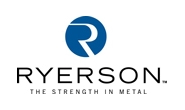Market Segment

August 6, 2019
Ryerson Misses Mark in Challenging Quarter
Written by Sandy Williams
Declining steel prices and inventory destocking contributed to a guidance miss for Ryerson Holding Corp. Although shipments increased 0.6 percent to 623,000 tons quarter-to-quarter, net sales fell 2.1 percent to $2.1 billion. Net income was $16.4 million, down from $30 million in the previous quarter and $18 million a year ago. Earnings per diluted share dropped to $0.43 from $0.78 in Q1 and missing Q2 guidance estimates of $0.77 to $0.97 per diluted share. Average selling price dipped 2.7 percent from Q1 to $1,934 per ton.
“Ryerson exceeded our second-quarter 2019 revenue guidance with higher tons shipped offset by average selling price declines that were in line with expectations,” said CEO Eddie Lehner. “However, margins declined more than our guidance due to cost of goods sold declining at a slower than expected pace relative to inventory replacement cost.”
Central Steel & Wire completed its first full year as a Ryerson subsidiary during a challenging market environment. CS&W inventory holding losses, which began in August 2018, accelerated in Q2 to $8 million along with mark-to-market hedging losses of $10 million. CS&W adjusted EBITDA, excluding LIFO, was negative $2.0 million, below expectations of positive $6.0 million for the period. HRC prices appear to be stabilizing and should result in inventory holding losses dissipating in the third quarter of 2019, said Lehner. Inventory position at CS&W has been reduced from almost 140 days at the time of acquisition to 91 days as of June 30, 2019.
Commenting on the market conditions in the second quarter, Lehner noted the price decline accelerated as demand weakened, supply increased, and trade concerns resulted in cautious buying.
About half of the recent mill price increases for HRC have taken hold, said Lehner, adding it is too early to tell if a $40 per ton hike in plate prices last week will hold.
There is ample sheet steel available in the market. “No problem getting sheet anywhere,” said Lehner.
For the third quarter of 2019, Ryerson anticipates revenues of $1.075 billion to $1.125 billion with tons shipped down 3 to 5 percent compared to the second quarter of 2019 due to normal seasonality and slowing end-market demand. Prices for carbon and stainless products are expected to move modestly higher in the last half of the year, while aluminum prices will move slightly lower. Due to the lagging effects of lower priced inventory in Q2 and lagging contract formula pricing, Ryerson expects average selling prices in the third quarter to be down 3 to 5 percent.
Ryerson anticipates more significant volume declines in the oil and gas sector to be offset by relative strength in commercial ground transportation and construction sectors.







